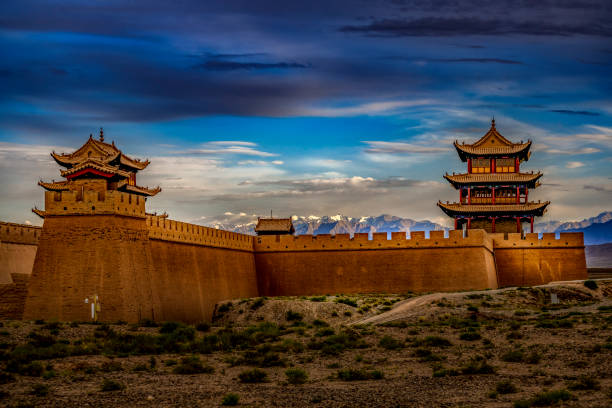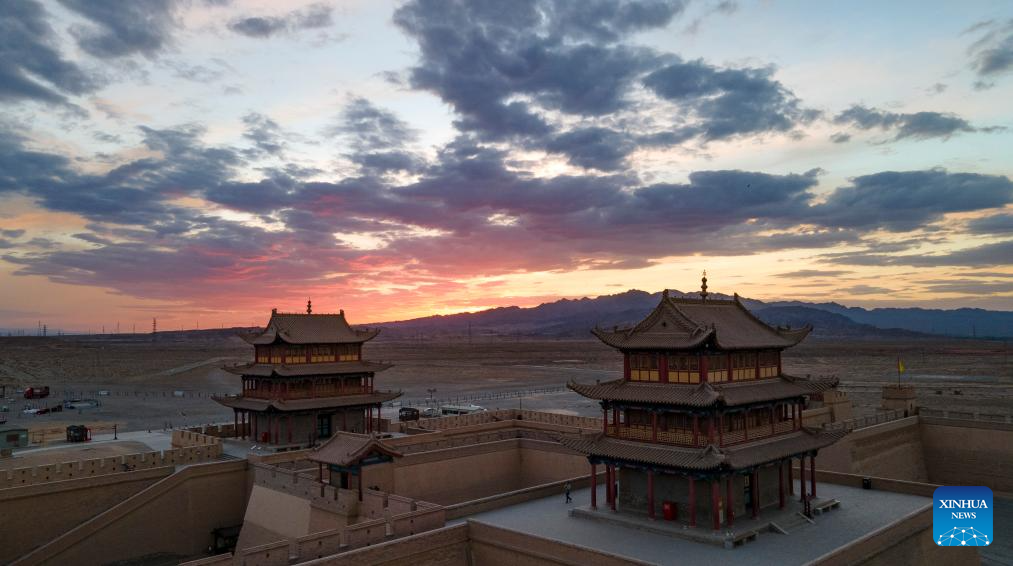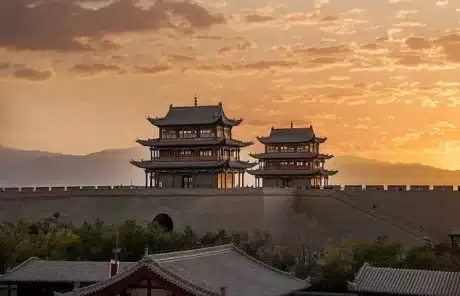Jiayuguan Pass: Where Ancient History Meets Stunning Landscapes

An Essential Guide to Visiting Jiayuguan Pass
Jiayuguan Pass, a jewel nestled in the rugged landscapes of Gansu Province, stands as a testament to China’s storied past and its significant role in the Silk Road trade network. This formidable fortress, often referred to as the westernmost outpost of the Great Wall, not only served as a critical defense point during the Ming Dynasty but also captured the imaginations of poets and scholars throughout history. As you traverse the arid beauty of the Gobi Desert and gaze upon the majestic Qilian Mountains, you will discover a tapestry woven with tales of ancient warriors, thriving commerce, and rich cultural heritage.
Visiting Jiayuguan Pass is more than just a journey into history; it’s an immersive experience that invites you to walk in the footsteps of those who once guarded this vital corridor. From the impressive architecture of Jiayuguan Fort to the breathtaking views along the Overhanging Great Wall, every corner of this area whispers stories of adventure and resilience. Whether you’re drawn by the allure of its historical significance, the stunning natural beauty, or the tantalizing local cuisine, Jiayuguan promises to captivate your heart and mind. So pack your bags and prepare for an unforgettable exploration of one of China’s most iconic landmarks!
In This Guide
- An Essential Guide to Visiting Jiayuguan Pass
- The Rich History and Legends of Jiayuguan Pass
- Main Highlights: What You Absolutely Can’t Miss
- Planning Your Visit: A Practical Guide
- Tickets: Prices, Booking, and Tips
- How to Get There: A Complete Transportation Guide
- Local Cuisine and Accommodation Nearby
- Frequently Asked Questions
- Final Thoughts on Your Trip
The Rich History and Legends of Jiayuguan Pass
Perched on the edge of the Gobi Desert in northwestern Gansu Province, Jiayuguan Pass is not just a breathtaking landscape but a veritable treasure trove of history and legend. As the westernmost outpost of the Great Wall of China, Jiayuguan has stood for centuries as a sentinel guarding the passage through the Hexi Corridor—an essential route for trade, migration, and cultural exchange along the ancient Silk Road.
The fortification of Jiayuguan began in the mid-16th century during the Ming Dynasty, a response to the need for a robust defense against northern invasions. Its strategic location made it crucial for controlling trade and military movements between Central China and the western frontiers. The construction of the Jiayuguan Fort took an impressive 168 years, resulting in a complex architectural marvel that includes an inner city, outer fortifications, and an elaborate moat. This impressive fort is often referred to as the “Throat of the Hexi Corridor,” underscoring its importance in ancient military strategy.
Legends swirl around Jiayuguan, enriching its historical significance. One such tale involves the mysterious “City Brick.” According to lore, during the fort’s construction, a craftsman named Yi Kizhan calculated the need for 99,999 bricks. Yet, upon completion, one additional brick was discovered atop the western gate tower. Facing potential punishment, Yi claimed that the extra brick was placed there by a deity, and its removal would bring the tower crashing down. The brick remains untouched to this day, a testament to the intertwining of faith and function in ancient architecture.
Another poignant legend is known as the “Song of Swallows.” Soldiers would strike specific positions on the city wall before departing for battle, resulting in a sound reminiscent of swallows chirping. This phenomenon was believed to be the spirits of fallen soldiers, offering a sign of protection and a promise of triumphant return. To this day, indentations from these stone strikes can be seen on the walls, and an experience zone has been created to honor this tradition.
The site is also graced by the Nine-Eyed Spring, a natural well that is said to have miraculously appeared when General Feng Sheng first surveyed the area for fort construction. Its nine springs, resembling stars, were interpreted as a heavenly omen, leading to the fort’s establishment nearby. This spring provided vital water resources for the soldiers stationed at Jiayuguan and remains a cherished landmark.
As the centuries rolled on, Jiayuguan evolved from a military bastion to a bustling trade hub. During the Qing Dynasty, as territorial expansion increased, the fort’s military significance waned, but its role as a customs post flourished, facilitating trade between Central China and regions as far-flung as Xinjiang. The opening of Jiayuguan as a trade port in 1888 marked a new chapter in its history, further integrating it into the broader context of Chinese economic development.
In recognition of its rich heritage, Jiayuguan was inscribed on UNESCO’s World Heritage List in 1987, drawing travelers and historians alike to explore its storied past. Restoration efforts in the early 2000s revitalized the fort and surrounding structures, ensuring that future generations can appreciate the grandeur of this historic site.
Today, Jiayuguan stands as a symbol of resilience and cultural exchange, inviting visitors to walk in the footsteps of ancient traders and soldiers. The echoes of history resonate through its walls, making it a must-visit destination for anyone seeking to delve into the rich tapestry of China’s past along the legendary Silk Road.

Jiayuguan Pass.
Main Highlights: What You Absolutely Can’t Miss
Jiayuguan Pass is a treasure trove of history, culture, and stunning landscapes that beckon international travelers to explore its wonders. Here are the must-see highlights that define this iconic destination along the ancient Silk Road.
Jiayuguan Fort
As the westernmost outpost of the Great Wall, Jiayuguan Fort stands as a monumental testament to ancient Chinese military architecture. Spanning an impressive 33,500 square meters, this fort features a moat, barbicans, and intricately designed buildings. Take time to wander through its inner city and contemplate the strategic significance it held in defending the Hexi Corridor against invasions. The fort’s impressive layout and historical importance offer a captivating glimpse into China’s past.
The Overhanging Great Wall
A short hike from Jiayuguan Fort, the Overhanging Great Wall is a marvel of engineering that appears to cling to the cliffs of the Black Mountain. This section of the Great Wall, built during the Ming Dynasty, provides breathtaking views of the Gobi Desert and the rugged landscape. Hiking to the beacon tower at the highest point rewards you with panoramic vistas and an exhilarating sense of history as you walk along its ancient stones.
Wei-Jin Tombs
Step into the past at the Wei-Jin Tombs, renowned for being the world’s largest underground gallery. The tombs boast exquisite murals depicting the daily life, customs, and culture of the noble class during the Wei and Jin dynasties. As you explore these ancient burial sites, you’ll gain insights into the rich tapestry of life that once flourished in this region, making it a fascinating stop for history enthusiasts.
The First Strategic Post
This iconic site marks the starting point of the Great Wall and is steeped in history. Here, you can explore the remains of the ancient beacon tower and take in the mesmerizing views of the Taolai River. A walk across the hanging bridge adds a sense of adventure to your visit, and the serene surroundings make it an excellent spot for reflection and photography.
Great Wall Museum
Dive deeper into the history and culture of the Great Wall at the Great Wall Museum, the first of its kind dedicated to this iconic structure. Home to over 2,250 collections, including rare relics, the museum provides an engaging experience that enhances your understanding of the Great Wall’s significance in Chinese history. With seven exhibition halls, you can spend hours exploring the stories behind this monumental feat of engineering.
Local Cuisine
No visit to Jiayuguan is complete without indulging in its delicious local cuisine. Treat your taste buds to Gansu flavors, especially the mouth-watering grilled lamb, beef noodles, and crispy pancakes. The vibrant markets, such as Zhenxing Market and Jingtie Market, are perfect for sampling these culinary delights and experiencing the lively atmosphere of the city.
Local Culture and Activities
Immerse yourself in the rich cultural tapestry of Jiayuguan by participating in local folk activities. Whether it’s watching a traditional shadow play or joining in the festivities of dragon and lion dances, these cultural experiences offer a unique insight into the customs and traditions of the region.
Scenic Landscapes and Natural Beauty
Lastly, don’t forget to take in the stunning landscapes surrounding Jiayuguan. The contrast of the rugged mountains, the vast Gobi Desert, and the picturesque Taolai River creates a breathtaking backdrop that enhances your visit. The view from Jiayuguan Fort, especially with the snow-capped Qilian Mountain in the distance, is not to be missed.
Each of these highlights at Jiayuguan Pass offers a unique window into the rich history, culture, and natural beauty of this remarkable location. Whether you’re a history buff, an adventure seeker, or a culinary enthusiast, Jiayuguan has something unforgettable to offer every traveler.

Jiayuguan Pass.
Planning Your Visit: A Practical Guide
Planning Your Visit: A Practical Guide to Jiayuguan Pass
Nestled in the arid landscapes of Gansu Province, Jiayuguan Pass is a historical gem that serves as a gateway to the ancient Silk Road and the westernmost point of the Great Wall of China. With its rich history, stunning landscapes, and vibrant local culture, Jiayuguan offers an unforgettable experience for international travelers. Here’s everything you need to know to make the most of your visit.
Getting There
By Air
Jiayuguan Airport is conveniently located just 9 kilometers from the city center. Direct flights are available from major cities such as Beijing, Xi’an, and Chengdu. Upon arrival, you can take an express bus to the Jiayuguan Cultural Relics Scenic Area for about CNY 15.
By Train
You can reach Jiayuguan by train, with services from numerous cities across China. From Jiayuguan Railway Station or Jiayuguan South Railway Station, catch Bus No. 4, 6, or 9 to the scenic area.
By Bus
If you’re traveling from nearby cities like Lanzhou, Zhangye, or Dunhuang, intercity buses frequently connect to Jiayuguan. Once in the city, use Bus No. 5, 6, or 9 to reach the attractions.
Where to Stay
Accommodation options in Jiayuguan cater to various budgets. Many hotels offer a unique courtyard-style experience, especially around the scenic areas. Here are a few recommended places:
-
Far East Hualun Hotel
Located about 3 kilometers from the fort, this family-friendly hotel features themed suites and is near a bustling food street. Rates range from CNY 400 to 600. -
Bailu Hidden Holiday Hotel
Nestled within the scenic area, this hotel offers rooms with mountain views, a hot spring pool, and a tranquil ecological courtyard. Prices vary from CNY 300 to 800. -
Jiugang Hotel
Centrally located, this hotel features rooms with views of the Qilian Snow Mountain and themed decor inspired by the Silk Road. Rates start at CNY 200 and can go up to 600.
Best Time to Visit
The ideal time to explore Jiayuguan is from May to October when the weather is relatively mild and the scenery is at its most beautiful. Expect clear skies and comfortable temperatures, perfect for hiking and sightseeing.
Must-See Attractions
-
Jiayuguan Fort
This architectural marvel is the centerpiece of the region, showcasing a sophisticated design that reflects its historical significance. Take a guided tour to fully appreciate its history and strategic importance. -
Overhanging Great Wall
A short hike from the fort leads you to the Overhanging Great Wall, known for its breathtaking views of the desert landscape and Black Mountain. The hike to the beacon tower offers a unique perspective on this ancient structure. -
Wei-Jin Tombs
These ancient tombs feature exquisite murals that reveal the rich culture of the Wei and Jin dynasties. The site is an archaeological treasure that provides insights into the lives of nobility during that era. -
Great Wall Museum
This museum is dedicated to the history and culture of the Great Wall, housing thousands of artifacts, including rare relics. It’s a great starting point for understanding the significance of Jiayuguan Pass in the broader context of the Silk Road. -
The First Strategic Post
As the starting point of the Great Wall, this site offers breathtaking views of the Taolai River and remnants of the ancient beacon tower. It’s an excellent spot for photography and reflection.
Local Cuisine
Don’t miss the chance to indulge in Jiayuguan’s culinary delights. Local specialties include:
-
Grilled Lamb
A must-try dish that showcases the flavors of Gansu cuisine. -
Beef Noodles
Savory and hearty, perfect for refueling after a day of exploration. -
Mutton Soup
A warming dish that highlights local ingredients and cooking traditions.
Visit the bustling Zhenxing Market or Jingtie Market for a variety of dining options and to experience the local food scene.
Practical Tips
- Entry Tickets: Your ticket covers access to Jiayuguan Fort, Overhanging Great Wall, and The First Strategic Post, valid for three days.
- Transportation: Use the sightseeing bus service for easy transportation between attractions for CNY 15.
- Luggage Storage: Conveniently store your luggage at the Jiayuguan Fort Customer Service Center.
- Sun Protection: Given the high UV levels, wear sun-proof clothing and sunglasses to protect yourself during outdoor activities.
Conclusion
Jiayuguan Pass is not just a historical site; it’s a doorway to understanding the rich tapestry of China’s past and its role in the Silk Road. Whether you’re an avid historian, a nature lover, or a culinary enthusiast, Jiayuguan promises a memorable adventure that will linger long after your visit. Start planning your journey today and immerse yourself in the wonders of this ancient treasure!

Jiayuguan Pass.
Tickets: Prices, Booking, and Tips
When planning your visit to Jiayuguan Pass, understanding ticket prices, booking options, and helpful tips is essential for a smooth experience. Here’s everything you need to know to make the most of your journey.
Ticket Information
A single ticket covers three of the main attractions in Jiayuguan: Jiayuguan Fort, Overhanging Great Wall, and The First Strategic Post. The ticket is priced at approximately CNY 40 (around $6 USD) and is valid for three consecutive days. This allows ample time to explore the rich history and stunning landscapes these sites offer.
Booking Your Ticket
Tickets can be purchased directly at the entrance of each attraction. However, for convenience, especially during peak tourist seasons, consider booking your tickets in advance online. Several travel platforms and local tour agencies offer pre-booking options. This not only secures your entry but can also save you time by skipping long queues at the entrance.
Getting Around
The three main sites are a bit spread out, so a sightseeing bus is available to shuttle visitors between them for a small fee of CNY 15 (around $2.30 USD). This service is particularly useful if you plan to visit all three sites in one day.
Tips for Visiting
- Plan Ahead: Given the popularity of Jiayuguan, especially from May to October, it is advisable to book your accommodations and tickets in advance.
- Luggage Storage: If you’re traveling light or wish to explore without carrying heavy bags, you can store your luggage at the Jiayuguan Fort Customer Service Center.
- Dress Appropriately: The sun can be strong, so wearing sun-proof clothing and bringing sunglasses is highly recommended. Comfortable shoes are also a must, as there will be plenty of walking involved.
- Explore Local Culture: Consider joining local folk activities and performances while you’re there. Engaging with the culture can enhance your overall experience and provide unique insights into the history of the region.
Armed with this information, you’re well on your way to enjoying a memorable visit to Jiayuguan Pass, a key highlight along the ancient Silk Road!
How to Get There: A Complete Transportation Guide
Reaching Jiayuguan Pass, a jewel of Gansu Province and a vital point on the ancient Silk Road, is a journey filled with excitement and anticipation. Here’s a comprehensive guide on how to get there, ensuring your adventure begins smoothly.
By Air
Jiayuguan Airport is the gateway for travelers flying in from various parts of China. Located just 9 kilometers from the city center, the airport connects Jiayuguan to major cities like Beijing, Xi’an, and Chengdu. Once you land, you can catch an express bus to the Jiayuguan Cultural Relics Scenic Area, which costs approximately CNY 15. This quick transfer will have you soaking in the local atmosphere in no time.
By Train
Traveling by train is another convenient option. Jiayuguan Railway Station and Jiayuguan South Railway Station are accessible from numerous cities across China. If you arrive at either station, you can take local buses (specifically Bus No. 4, 6, or 9) to reach the Jiayuguan Cultural Relics Scenic Area. Train travel not only offers comfort but also spectacular views of the Gansu landscapes as you approach your destination.
By Bus
If you’re starting from nearby cities in Gansu, such as Lanzhou, Zhangye, or Dunhuang, you can hop on a long-distance bus to Jiayuguan City. Once you arrive at the bus station, local Bus No. 5, 6, or 9 will take you directly to the scenic area. This option is economical and allows you to mingle with locals, providing a more authentic travel experience.
Local Transportation
Once in Jiayuguan, navigating the city and its attractions is straightforward. For those looking to visit the major sites—Jiayuguan Fort, the Overhanging Great Wall, and the First Strategic Post—consider purchasing a combined ticket valid for three days. This ticket includes access to all three locations, making it convenient for multi-day exploration.
There are also sightseeing buses available that shuttle between the major attractions for CNY 15, allowing you to travel comfortably without the need for extensive walking. Alternatively, taxis and ride-sharing services are available for more personalized transport.
Travel Tips
- Advance Booking: If you’re traveling during peak seasons, it’s advisable to book your accommodation in advance to secure a comfortable stay.
- Luggage Storage: Should you need to explore without your bags, the Jiayuguan Fort Customer Service Center offers luggage storage services.
- Dress Appropriately: The UV levels can be high in this region, so wearing sun-proof clothing and sunglasses is recommended.
With these transportation options and tips, your journey to Jiayuguan Pass is sure to be seamless and enjoyable. Prepare to be captivated by the rich history and stunning landscapes that await you!

Jiayuguan Pass.
Local Cuisine and Accommodation Nearby
When visiting Jiayuguan Pass, not only will you be captivated by its historical significance and stunning landscapes, but you’ll also have the chance to indulge in the region’s exquisite local cuisine and find comfortable accommodations nearby.
Savor the Flavors of Jiayuguan
Jiayuguan offers a delightful culinary journey that reflects the rich cultural tapestry of Gansu Province. Among the must-try dishes are:
- Grilled Lamb: A local specialty that’s both tender and flavorful, often marinated in a blend of spices and grilled to perfection.
- Beef Noodles: This hearty dish features hand-pulled noodles served in a savory broth with thinly sliced beef, perfect for refueling after a day of exploration.
- Mutton Soup: A warming dish that combines tender mutton with a fragrant broth, ideal for the cooler evenings.
- Crispy Pancakes and Steamed Twisted Rolls with Chicken: These snacks provide a satisfying crunch and are great for a quick bite.
For a true local experience, visit the Zhenxing Market or Jingtie Market, where you’ll find a plethora of eateries serving these delectable dishes. The lively atmosphere and the aroma of freshly cooked food will entice your senses.
Comfortable Stays Near Jiayuguan Pass
After a day of sightseeing, unwind at one of the many accommodation options in Jiayuguan. Here are a few top recommendations:
-
Far East Hualun Hotel
Located about 3 kilometers from the Jiayuguan Fort, this hotel features themed suites, including kid-friendly designs like B.Duck and the Octonauts. It’s also conveniently situated near a food street, making it ideal for families.
Price Range: CNY 400 – 600 -
Bailu Hidden Holiday Hotel
Nestled within the Jiayuguan Fort scenic area, this hotel offers rooms with breathtaking views of the snow-capped mountains. Guests can enjoy a hot spring pool and a quiet ecological courtyard, along with complimentary pick-up services.
Price Range: CNY 300 – 800 -
Jiugang Hotel
Situated in the city center, this hotel provides a unique view of the Qilian Snow Mountain and Jiayuguan Fort. The rooms are themed around the Silk Road, and the on-site restaurant serves a variety of local cuisines.
Price Range: CNY 200 – 600
Whether you’re sampling the local delicacies or resting in a cozy hotel, Jiayuguan ensures that your visit is as memorable as the ancient walls that surround it. Enjoy your culinary adventure and comfortable stay as you explore this historical gem on the Silk Road!

Jiayuguan Pass.
Frequently Asked Questions
Frequently Asked Questions about Jiayuguan Pass
1. What is Jiayuguan Pass, and why is it significant?
Jiayuguan Pass, located in Gansu Province, China, is the westernmost outpost of the Great Wall and a crucial point along the ancient Silk Road. It played a vital role in China’s defense during the Ming Dynasty and was recognized for its strategic importance in historical writings. Visitors can explore its impressive fortifications and gain insight into China’s rich history.
2. When is the best time to visit Jiayuguan?
The ideal time to visit Jiayuguan is from May to October, when the weather is relatively mild and the scenery is at its most beautiful. This period allows travelers to enjoy outdoor activities and fully appreciate the stunning desert landscapes.
3. How do I get to Jiayuguan?
You can reach Jiayuguan by air, train, or bus. Jiayuguan Airport is about 9 kilometers from the city center, with flights from major Chinese cities. Alternatively, trains from cities like Lanzhou and Dunhuang arrive at Jiayuguan Railway Station. Local buses and taxis can take you from the stations to the scenic areas.
4. What are the must-see attractions in Jiayuguan?
Key attractions include Jiayuguan Fort, the Overhanging Great Wall, the First Strategic Post, and the Wei-Jin Tombs. Each site offers unique insights into the region’s history and architecture, making them essential stops for any visitor.
5. Are there guided tours available in Jiayuguan?
Yes, there are various guided tours available that focus on Jiayuguan’s history and cultural significance. These tours can be customized according to your interests and can enhance your understanding of the sites you visit.
6. What local dishes should I try while in Jiayuguan?
Don’t miss out on local specialties such as grilled lamb, beef noodles, and mutton soup. Exploring local markets like Zhenxing and Jingtie will provide you with plenty of delicious dining options.
7. Is it easy to find accommodation in Jiayuguan?
Yes, Jiayuguan offers a range of accommodations, from budget hotels to mid-range options. Many hotels are conveniently located near the scenic areas, making it easy to explore the attractions.
8. What should I pack for my trip to Jiayuguan?
Pack light, breathable clothing for warm weather, as well as sun-protection items like hats and sunglasses due to high UV levels. Comfortable walking shoes are also recommended for exploring the historical sites and hiking the Overhanging Great Wall.
Final Thoughts on Your Trip
As you prepare to leave the enchanting Jiayuguan Pass, take a moment to reflect on the extraordinary journey you’ve embarked upon. This westernmost outpost of the Great Wall is not merely a historical site; it is a vivid tapestry woven with tales of ancient defense, trade, and cultural exchange along the legendary Silk Road. The majestic fortifications, breathtaking landscapes, and rich local traditions invite you to step back in time and connect with the spirit of those who once traversed this critical corridor.
Whether you marveled at the intricacies of Jiayuguan Fort, strolled along the Overhanging Great Wall, or savored the mouth-watering local cuisine, each experience adds a unique brushstroke to your travel story. The warmth of the local culture, embodied in folk performances and hearty meals, will linger in your memory long after you’ve left. Jiayuguan is a place where history breathes and nature inspires, offering a profound sense of connection to both the past and the present.
As you journey onward, carry with you the stories of Jiayuguan, the echoes of the spirits who once guarded its walls, and the flavors of Gansu that tantalized your taste buds. This remarkable destination leaves a lasting impression, reminding you that every travel experience enriches your understanding of the world. Embrace the adventure that lies ahead, knowing that Jiayuguan Pass will always remain a cherished chapter in your travel memoirs. Safe travels!